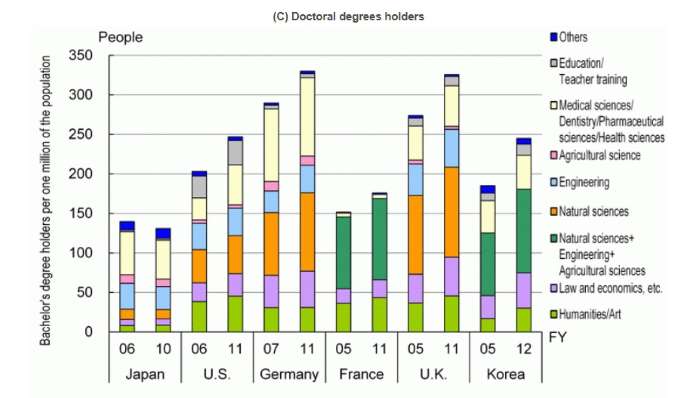
Social science research plays an important role in a country’s socio-economic development by enhancing the understanding of the functioning of the society and improving individual and administrative decision making. While there has been an increase in the quantity of research, little attention has been paid to its quality. There has been a mushrooming of research publications and increased allocation for doctoral fellowships. But these improvements are hardly matched by the quality of social science research because of inadequate academic infrastructure, quality faculty, as well as the lack of academic and financial resources.
The findings of the All India Survey of Higher Education 2019-20 (AISHE) on doctoral research do not make a pleasant reading. Doctoral research accounts for almost two thirds of the total research output in the country. The survey finds that only 2.7% of the colleges in India offer PhD programmes. In 2019-20, a total of 202,550 students enrolled for Ph D programmes, which is just 0.5% of the total enrolment. At least 55% of the Ph D candidates enrolled in the year were men.
In India, most of the enrolment in doctoral programmes are in physical science and engineering. At 19,965, all the disciplines of social science together accounted for less than 10% of the enrolments. Among the disciplines of social science, the highest number of enrolments was in economics, which receives lot of funding support.
READ I Opportunity beckons India’s higher education sector
Disparities in social science research
The institutional mechanism governing premier institutes across India is diversified in every way. The selection of candidates into the programme, training and output are varied in different institutions. The centres of research are established with the aim of broadening the research agenda. The difference in quality of research output indicates the divergence in methods and curriculum of doctoral students across the country. This is evident in social science disciplines, particularly in economics, at institutes of national importance such as Delhi School of Economics, IGIDR, JNU, University of Hyderabad, CDS, and ISEC.
Even more worrying are the disparities in the quantity and quality of research across the country. This article focuses on the reasons for these disparities and suggests some solutions to address the backwardness of social science research in India. The spread of excellence cannot be equal, but the disparities in the quality of research is truly worrisome. There is no way of verifying how and why the institutions have performed the way they have, in the absence of a centralised mechanism of evaluation and robust database infrastructure. The asymmetry in selection and training gets reflected in the quality of the output.
Another worrisome issue is the decentralised nature of recruitment to faculty positions in universities and colleges across the nation. There is no institutional mechanism to channelise advertisements of faculty and research positions. While it is difficult for institutions to advertise effectively in print, electronic and digital media to reach a large pool of deserving candidates, it is tough for students also to receive information on vacancies. Though the process has been greatly facilitated by the growth of digital and social media, the advertisements drown in the deluge of information being churned out by these platforms.

READ I Budget 2021 has the intent, but lacks funds for quality education
A centralised solution
A solution to the problems of social science research may be a facility to choose the curriculum provided by UGC or independent institutions. National organisations such as the Indian Economics Association could be empowered to do this job. A panel of experts that oversees the capacity building across the research departments across the country could help. The threat of losing NAAC accreditation forces educational institutions to fabricate the data presented to the invigilating team. This is why the available data fail to give the real picture.
Representations of subject-specific departments at the national level will ensure the smooth flow of quality information. There is a powerful counter-argument that specialisation of institutes varies so they needn’t follow the same curriculum. In the days of digital revolution, centralised systems can benefit from e-learning opportunities. The best way to benefit from this is a national benchmarking that allows institutional level modifications. This will also benefit students across the nation by bridging the knowledge and skill gap and improving their ability to grasp newer and advanced developments.
The learning systems may look sound at the institutional level, but the reality is entirely different from the students’ perspective. A system of selection of scholars to doctoral programmes should be robust enough to ensure parity in terms of fairness, stability and efficiency. The fairness of the system is already broken with the disparities existing at the national level. Stability means the scholar should be compensated at the opportunity cost. A system is efficient only when it satisfies the goal of the programme in terms of optimal research output. The Indian research system lags on all these three counts.
READ I Adolescents have not been well served by responses to Covid-19, climate change
Suggested policy improvements
A faculty assessment mechanism can be developed to break the existing nexuses and reduce corruption in hiring. This can improve the quality of research through efficient allocation of academic talent to institutions across the nation. Developmental research using modernised tools will help the government understand the social realities better and help in framing of right policies. A centralised, yet flexible system of selection and training of Ph.D. scholars will reduce unnecessary burden on students and increase the gross national research output. It will also help in capacity building for solving real-world problems.
The focus on quality of social science research is important as we are dependent on others for solving our problems even after so many years of independence. India’s diverse culture, geography and economic composition give it an edge in research. India can be a hub of quality research that explores innovative ideas to solve modern problems. For social science research to be able to shape public policy, it needs a robust ecosystem with effective institutions. To enhance the quality, the government can come up with a national policy on social science research.
Modern issues require modern solutions. It is high time the government and the academic community recognised the need to facilitate research that can solve problems of the society and ensure collective welfare. For this, the organisational structure, curricula and training methods need to be revolutionised with an eye on the needs of a globalised digital reality.
(Kaibalyapati Mishra is a research student at the Centre for Economic Studies & Policy, Institute for Social & Economic Change, Bengaluru.)

